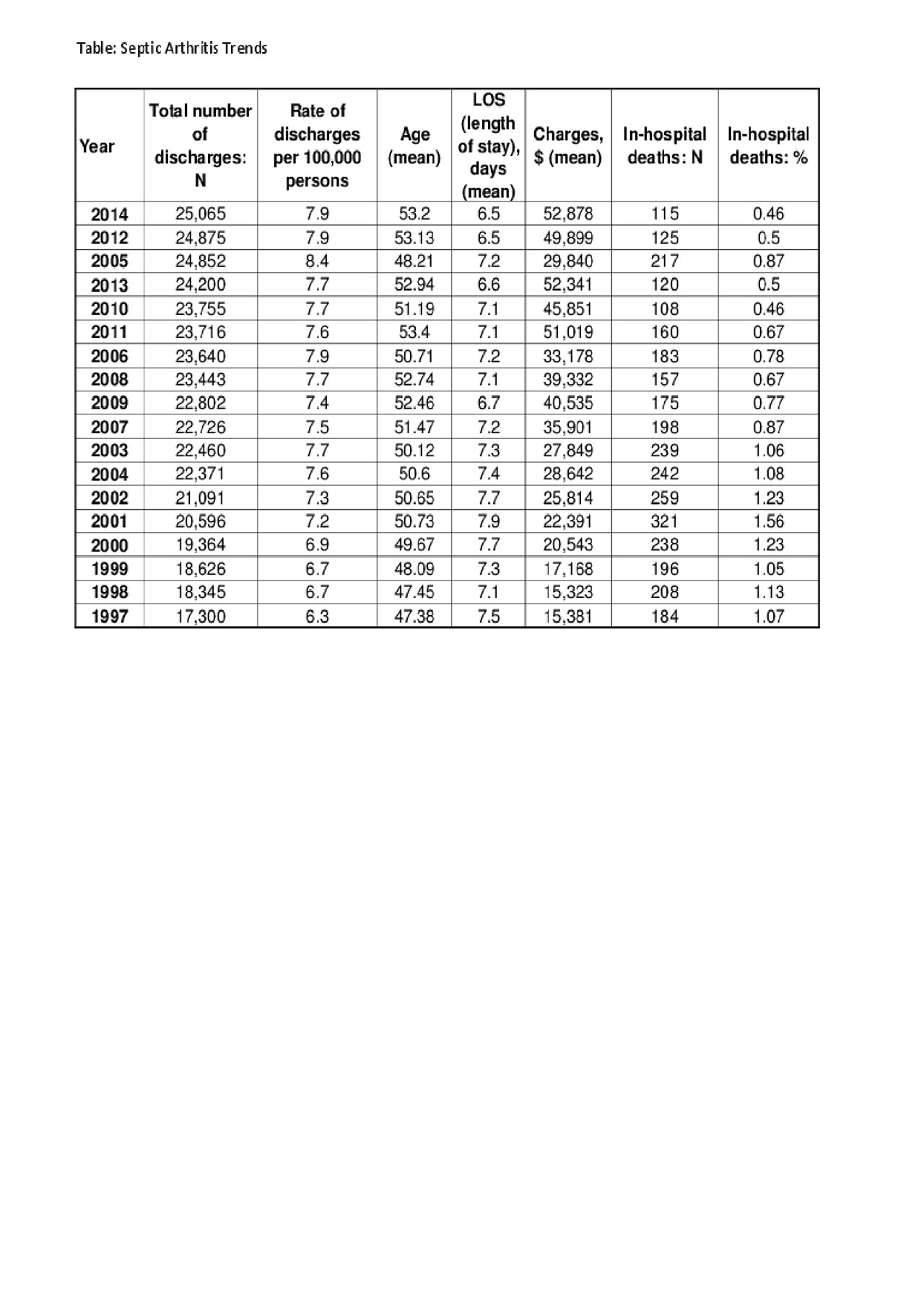Session Information
Session Type: Poster Session (Tuesday)
Session Time: 9:00AM-11:00AM
Background/Purpose: Bacterial septic arthritis is a serious cause of morbidity and mortality, constituting one of the true musculoskeletal emergencies. In this abstract, we describe hospitalization trends for patients with bacterial septic arthritis in the USA over multiple years.
Methods: Data were abstracted from the National Inpatient Sample Databases. This database is the largest longitudinal collection of inpatient admission data in the USA. It is a nationally representative sample of 20% of admissions from approximately 1000 hospitals pertaining to approximately 7 million inpatient hospital admissions. The numbers in the databases are weighted to optimize both national estimates and longitudinal analysis. The databases were searched for patients admitted from 1997 to 2014 with an ICD-9 septic arthritis codes 711.0 -711.09 listed as the principal diagnosis. Codes for fungal, mycobacterial and viral arthritis were not included. The total number of septic arthritis discharges, number of in-hospital deaths, percentage of in-hospital deaths, rates of discharges, length of stay (LOS), hospital charges and ages were recorded.
Results: An average of 22,179 hospital discharges per year (range 17,300-25,065) had an ICD-9 bacterial septic arthritis code listed as the principal diagnosis from 1997 to 2014. The average rate of discharges was 7.45/100,000 persons (range 6.3-8.4). The average age was 50.8 years. The average hospital charges was $33,549 (range 15,323- 52,878). The average LOS was 7.2 days (range 6.5-7.9). The in-hospital deaths averaged 0.87% of those admissions. The annual trend for in-hospital deaths for septic arthritis seemed to both improve and parallel the overall improvement for deaths for all hospital discharges during same time period. This type of analysis is greatly limited by inability to determine actual cause of death.
Conclusion: This data gives us valuable information on the magnitude, cost, and temporal trends of septic arthritis hospitalizations in the USA. Our analysis shows septic arthritis resulted in an average of 22,179 hospital admissions per year. The rate of discharges per 100,000 was very low and stable from 1997 to 2014. Septic arthritis admissions averaged a LOS of 1 week and had an average hospital charge of $33,549. For a condition thought of as a rheumatologic emergency, it had a surprisingly low in-hospital mortality and has been trending in a favorable direction.
To cite this abstract in AMA style:
Kambhatla S, Gauto-Mariotti E, MANADAN A. Hospitalization Trends for Bacterial Septic Arthritis in the United States from 1997 to 2014 [abstract]. Arthritis Rheumatol. 2019; 71 (suppl 10). https://acrabstracts.org/abstract/hospitalization-trends-for-bacterial-septic-arthritis-in-the-united-states-from-1997-to-2014/. Accessed .« Back to 2019 ACR/ARP Annual Meeting
ACR Meeting Abstracts - https://acrabstracts.org/abstract/hospitalization-trends-for-bacterial-septic-arthritis-in-the-united-states-from-1997-to-2014/

